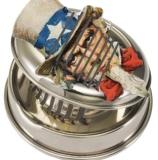Protect and ... What Was the Other Thing?
 Tuesday, May 16, 2006 at 08:49AM
Tuesday, May 16, 2006 at 08:49AM  Quote: "They are a part of American life, but they are beyond the reach and protection of American law.” President Bush.
Quote: "They are a part of American life, but they are beyond the reach and protection of American law.” President Bush.
Figure of Speech: parallelism, the figure of similar structure.
President Bush is trying to placate the right and solve a real problem — illegal immigration — at the same time. His primetime speech to the nation reveals a mastery of parallelism, a technique that balances the rhythm or meaning of clauses. In this case, he lays mercy beside get-tough: American life beside American law.
There’s a further balancing act here: the "reach and protection" of that law. The phrase implies that illegals escape from the law while suffering from its absence. An apotheosis of compassionate conservativism.
Parallelism is a general term that comprises more specific figures; you’ll find them here. It gladdens our rhetorical heart to see Bush using them; they require a balanced mind. We weren’t sure the president had one.
Snappy Answer: "More protection and less reach, please."






